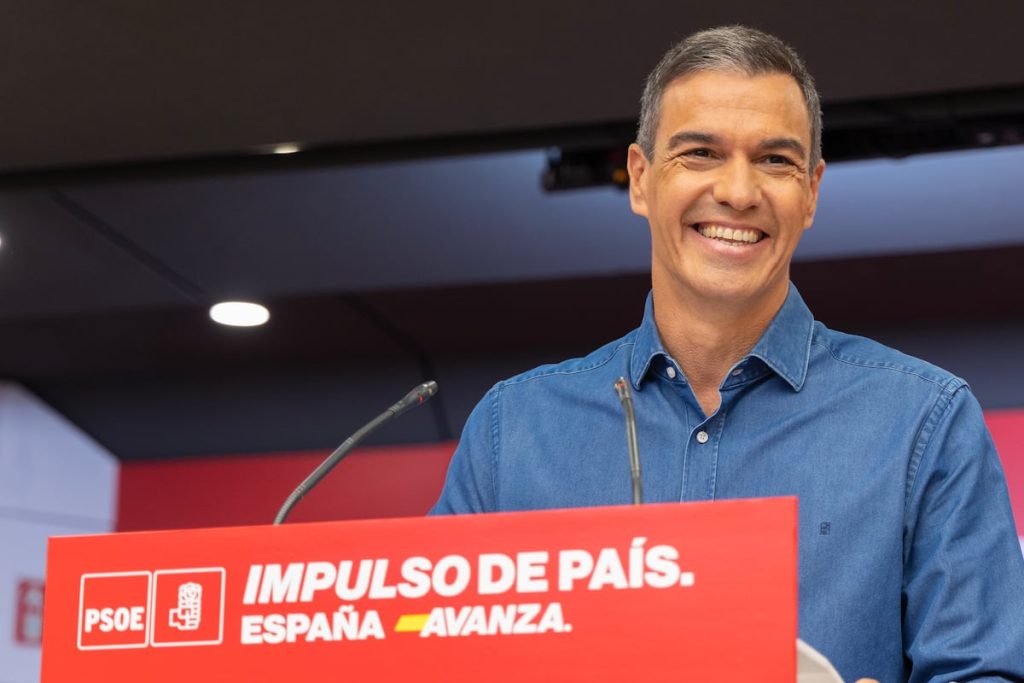In their summer quarters, Pedro Sánchez and his allies followed the Democratic Convention in the United States in August and have returned to political activity determined to import Kamala Harris’s strategy of good vibes, joy, and hope. Without arguments to combat the PP over the singular funding pact and without certainty of a stable majority in Congress, socialists from all but Catalonia have been fearing the fall for weeks as a threat. Now Sánchez presents it as an opportunity. “It will be worth it, there are no elections, no excuses for noise,” he proclaimed before the Federal Committee, all optimism and gratitude five months after those five days of reflection in April at home due to the judicial investigation into his wife. This Saturday has been Sánchez’s reunion with the highest socialist organ after all that. The alarm caused by the Catalan pact led some territorial leaders to urgently request the convocation of the party organs, but Sánchez has appeared before the PSOE when and how he wanted, as has been the case since he swept the primaries in 2017. With Emiliano García Page and Javier Lambán uttering the boldest phrases, with the novelty of some substantive interventions by other territorial leaders and with mild criticism from Extremadura or Castilla y León. With all that, yes; but the PSOE has emerged from the meeting without the expression of internal discomfort that would harm the socialist leader.
Sánchez will be reelected and strengthened at the helm of the PSOE at the end of next November at the 41st Federal Congress, and those who want to maintain their positions in subsequent regional conclaves know that going against him does not add up for them (with the exception of García Page, of course). Ferraz may not be able to impose the leader they want in all federations, but with Ferraz against them, everything is much more difficult or almost impossible. In that context, that of a party that is now opening its internal renewal process from top to bottom, many positions taken this Saturday must be interpreted. An illustrative example of this is Juan Lobato’s closed-door intervention before the President of the Government. Considering what has been seen, Sánchez reasonably has the organic patio under control, but he still has to master the narrative and the mood of his own, of the militants, and of the progressive electorate who are bewildered by the heated territorial debate. He aims to convince that this autumn is just another chapter in the well-known serial “Spain is breaking apart,” by the scriptwriters of the catastrophe that never comes, and he has to disarm the “doomsayers and worriers,” even from his own party, with smiles and frivolity.
All in a positive light, “with charged batteries, new ideas, and the best teams.” “With or without the support of the opposition. With or without the participation of the legislature,” he has gone so far as to proclaim openly. There are those who have left the Ramón Rubial room of the socialist headquarters without a clear idea of how the coming months could be if the worst forecast comes true, without the legislative power, without a majority in Congress, but they haven’t asked about it inside. “We are not here to entertain ourselves,” explained a provincial secretary. Those in the Moncloa and Ferraz know the difficulty of the coming months and need Pedro Sánchez to have the party behind him to face it. To convey that it is possible and, if it is not, at least it must be “tried,” which is what the president came to say in his motivational speech at the start of the Federal Committee. That evocative “when we fight, we win” from Kamala Harris. The last weekend of November, in Seville, the PSOE is summoned to a conclave in which they will not be able to showcase the inspiring image of unity from the Democratic Convention (Sánchez already had that in his 40th Congress in October 2021), but the president needs to dispel the fears that run through socialist conversations after the agreement with ERC to make Salvador Illa president. In the leader of the PSC, he has a good ally: “I know what Spain is and what Catalonia is. I know that I am where I am as a result of a collective effort of all of you. The same enthusiasm, the same conviction, the same selfless effort, and the same help that we socialists in Catalonia have felt, we will return it multiplied.”
What affects most is what happens closer.


